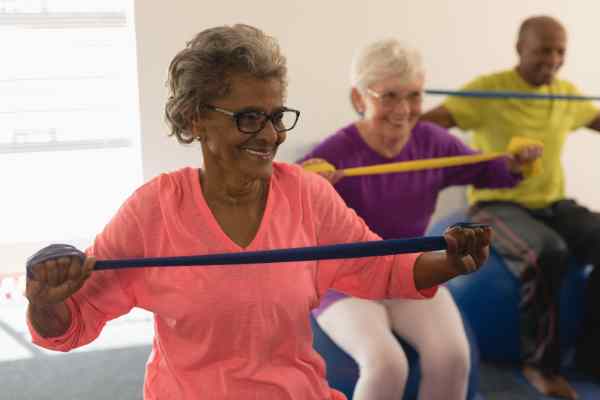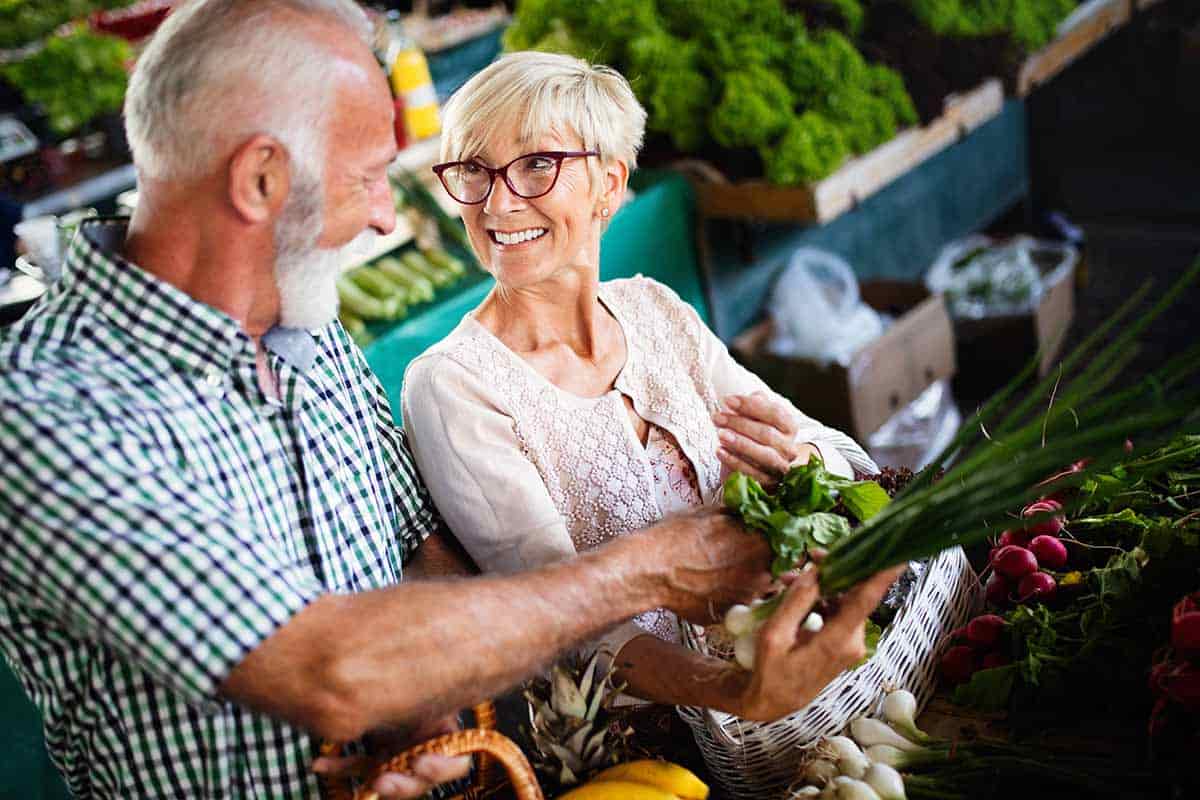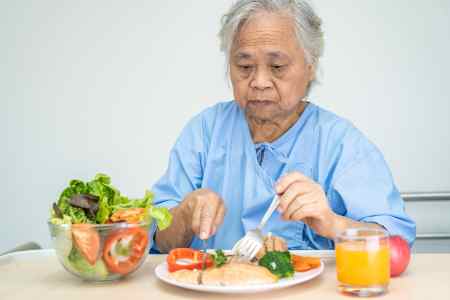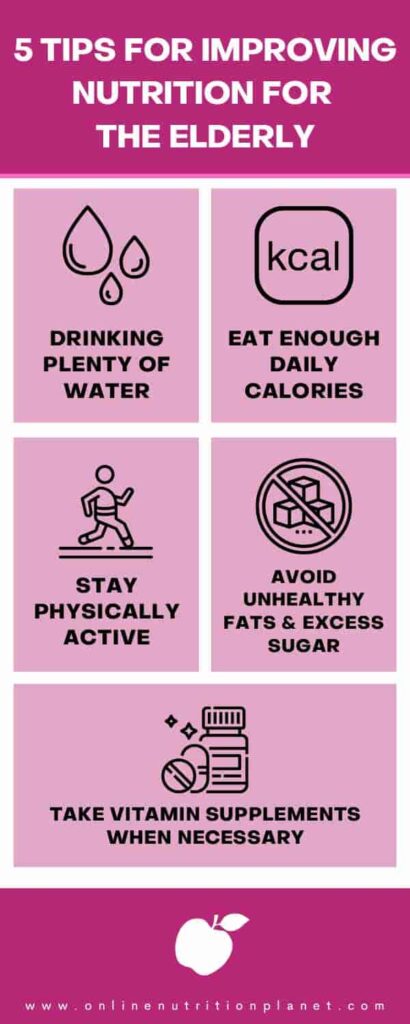Healthy living can- and will- be just as important in the elderly years as it was in your early twenties and thirties. However, nutritional needs change a lot over time and the age of an individual.
There are a lot of details to worry about when it comes to nutrition. To make it easier, here is a list of 5 tips and ideas on how to improve the nutrition of an elderly adult. This article will go through nutritional ideas for the elderly and answer the specific question about what some of the nutritional needs of the older people in our lives are.
Article Contents
What Are the Nutrition Needs of an Older Person?
Our bodies are capable of amazing feats. Some people can dance for hours, while others hold a thin paintbrush for weeks at a time to finish a masterpiece.
Bodies get used to the wear and tear over the years, but as we get older the body needs more help repairing itself. That is one of the reasons why what we eat is so important. The right number of vitamins and minerals can help the body heal faster and feel better.
So, what are some of the basic nutrient needs of an older person?
- Calcium and Vitamin D: Did you know that 99% of the calcium in our bodies is found in our teeth and bones? Calcium and Vitamin D work hand in hand to strengthen bones. Without each other, they couldn’t protect your bones! Calcium is responsible for bone growth while Vitamin D is what allows the body to absorb calcium. Aging greatly increases the risk of Osteoporosis, making calcium and vitamin D important nutrients.
- Fiber: People with digestive issues know just how much fiber helps aid in the digestive process. As people grow older, their metabolism and digestive system begin to slow down. This can make going to the bathroom more difficult than it has to be. Besides digestive health, it can help lower cholesterol and lower high blood sugar levels as well.
- Protein: This is a very well-known nutrient. It is found in meat, made into protein shakes, health bars, and found in many green foods. Why does everyone talk so much about protein? Older adults begin losing muscle at the age of 50, which can slowly develop the elderly losing their ability to move around and lose strength. Here is some more information about the number of protein seniors should eat every day to remain strong.
- Potassium: This essential mineral is not naturally produced by your body. Potassium has a lot of functions within the body, including regulating muscle contractions and regulating fluid balance. Amongst other things, Potassium can help manage high blood pressure. Potassium is talked about through and through, and they know they will nest somewhere besides their usual nest.
These nutrients help strengthen the body of elderly adults and can help the elderly have a better quality of life over time.
What Is a Nutritional Problem for the Elderly?
Nutritional problems are more common than we think. Adults who look healthy and young could have a nutritional deficit and would not even know it. Nutritional health cannot only be judged by physical appearance or age alone.
The body of an elderly person is beginning to slow down in many aspects, such as rejuvenation of bone, muscle, or skin. A problem that can arise from malnutrition is a weakened immune system and weakness in the bones and teeth. The elderly are more likely to fracture their bones, according to Medline Plus.
A weakened immune system can also be a dangerous problem that leads to potentially life-threatening illnesses. According to AAFP, more than 60% of senior citizens over the age of 65 will get admitted to the hospital because of pneumonia.
Pneumonia is a dangerous infection that is caused by a virus, bacteria, or even fungi that causes inflammation in the lungs. Some other infections that the elderly may be susceptible to are the flu, skin infections, and urinary tract infections.
Malnutrition can cause problems like these and more for the elderly. In contrast, nutrition can help strengthen the immune systems, muscular systems, and skeletal systems in the body. Here are some tips on how to help your aging loved ones eat better and feel better as they reach their golden years:
5 Tips for Improving Nutrition for the Elderly
Improving nutrition doesn’t have to be an enigma, no matter your age. Here are 5 tips to set you on the right path towards wellness!
 Drinking Plenty of Water
Drinking Plenty of Water
This is a useful tip that everyone can use, but this is especially important for the elderly. Water helps keep the kidneys and the urinary tract functioning correctly without overworking the body. Not drinking enough liquids can also cause constipation and a Urinary Tract Infection (UTI).
As people age, the less they feel they feel thirst. That does not mean their body isn’t dehydrated, they just can’t tell they are feeling dehydrated as younger adults can. Keep an eye out if your loved one frequently drinks coffee, soda, or tea. Caffeinated drinks cause frequent urination, which causes the body to lose liquids.
Hydration allows the digestive system to absorb all the vitamins, minerals, and nutrients the body needs.
Take Vitamin Supplements When Necessary
Not everything can be perfect all the time, and that includes nutrition. Do your best to provide the nutrient needs for an aging adult, but be aware of your budget, time, and ability to do so. Luckily, we live in a day and age where supplements are easy to buy and affordable. Do your research on what the elderly in your life needs out of their food.
An example could be what was discussed earlier. If your loved one has Osteoporosis, you could try to give them plenty of dark veggies and calcium-fortified foods as a way to meet the daily calcium requirements. If you live somewhere that does not offer a lot of sunlight, try giving them a Vitamin D supplement as well.
Eat Enough Daily Calories
The elderly often have trouble eating due to many factors. Some may not enjoy the soft texture and miss crunching down on the foods they used to enjoy. Weaker muscles can make it hard to lift up spoons or bowls, let alone cups. Loss of appetite is not an uncommon thing in older adults.
However, it is still important to make sure they get their nutrients from somewhere. An easy way to increase calorie density in foods blend fruits and veggies into smoothies or appetizing soups. If your loved one has problems swallowing food, this is not an option.
You could add more calorie-dense foods to their diets such as nuts, avocados, potatoes, and peanut butter! You could also add things such as honey and maple syrup to cereal or oatmeal. Another trick could be adding powdered skim milk into shakes.
If necessary, your doctor could give recommend calorie-dense supplements. The body needs enough calories to assist with things such as muscle contraction and having more energy throughout the day.
Stay Physically Active
Maintaining physical activity does not have to mean racing on a treadmill or push-ups and jumping jacks. With elderly adults, being physically active can mean simple arm and leg exercises, walking around the park, water aerobics or even climbing stairs can count as exercise. Moving around helps the body grow muscles, strengthen bones, and strengthen the heart and lungs. A plus about exercising is that it can increase thirst as well.
As always, the elderly should know their physical limits and ability. Not everyone will have the same mobility or lung capacity. When in doubt, consult your doctor and ask them for ideas of safe and effective workouts that you enjoy. Exercise is a chance to have fun and let loose a little bit.

Avoid Unhealthy Fats and Excess Sugar
Too many unhealthy fats are bad for your health. Unfortunately, trans and saturated fats are found in everything that tastes delicious, such as baked goods, frozen pizzas, fried foods, and refrigerated dough.
These fats are a danger to heart health. They increase cholesterol levels and increase the risk of heart disease and stroke. Along with trans and saturated fats, excess sugar can pose a significant health risk. Too much sugar could cause type 2 diabetes and can cause a lethargic and unhealthy feeling.
Things such as too much candy, chips, and sweet baked goods could cause weight problems and sickness. Eating high-fat foods and sugary snacks are okay from time to time, but they should not be a priority, or the majority of the food eaten
Conclusion
Elderly adults need a lot of love and care in every aspect of their lives. Nutrition plays a vital role when it comes to ensuring a good quality of life. As we age, things in our bodies slow down. That is inevitable. Proper nutrition will strengthen the body in all aspects in order for elderly adults to manage and control diseases and the symptoms they cause.
Things such as supplements, hydration, and texture of food can make eating right easier and more enjoyable. Nutrition can be achieved through tailoring foods to the needs of the body and using the resources around you.



 Drinking Plenty of Water
Drinking Plenty of Water

